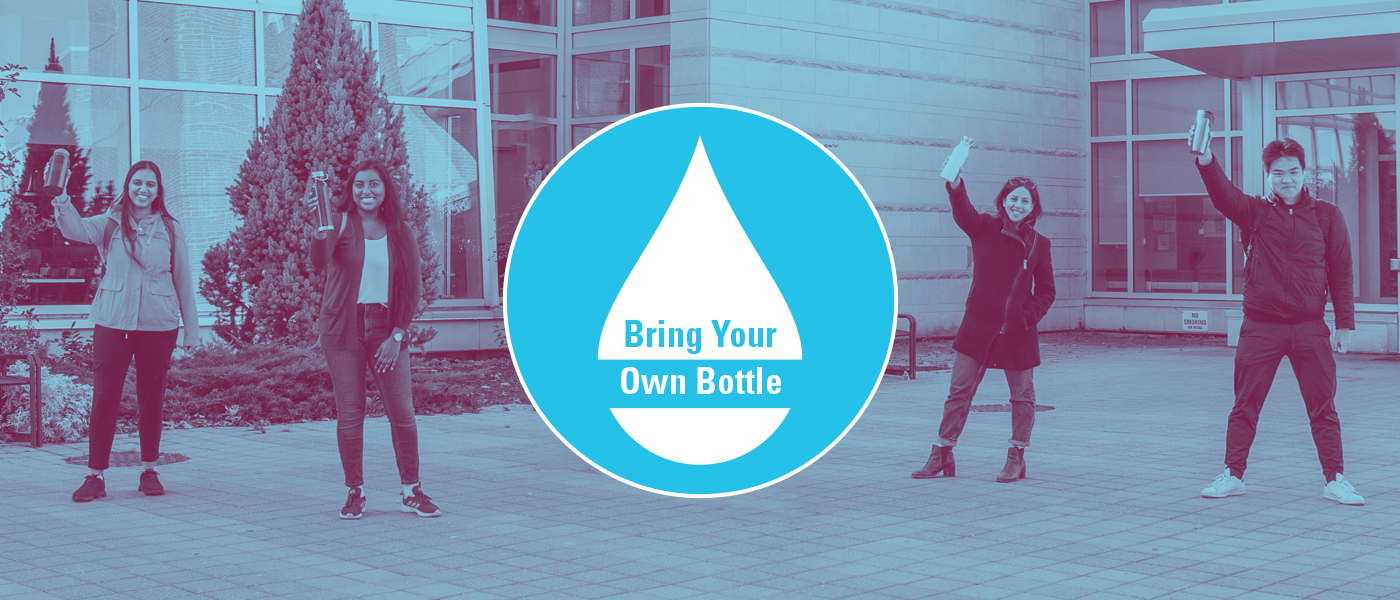Bring Your Own Bottle
The Bring Your Own Bottle initiative aims to reduce the use of single use plastic water bottles by encouraging the McMaster community to use the water bottle filling stations located throughout campus.
Expandable List
- Participating in university events such as Welcome Week to spread awareness of campaign (Ongoing)
- Hosting of events and engagement campaigns (Ongoing)
- Involvement with student experiential learning projects:
- SUSTAIN 3S03 (Fall 2022)
- SUSTAIN 4S06 (Winter 2022)
- Creation of an interactive map of water refill stations on McMaster’s Westdale Campus (Completed August 2022)
- Installation of BYOB signage throughout campus (Completed September 2022)
- Redesigned water fountain testing program for efficiency (Completed September 2022)
- Communication to incoming residence students through residence life (Annually)
Why Reusable Bottles?
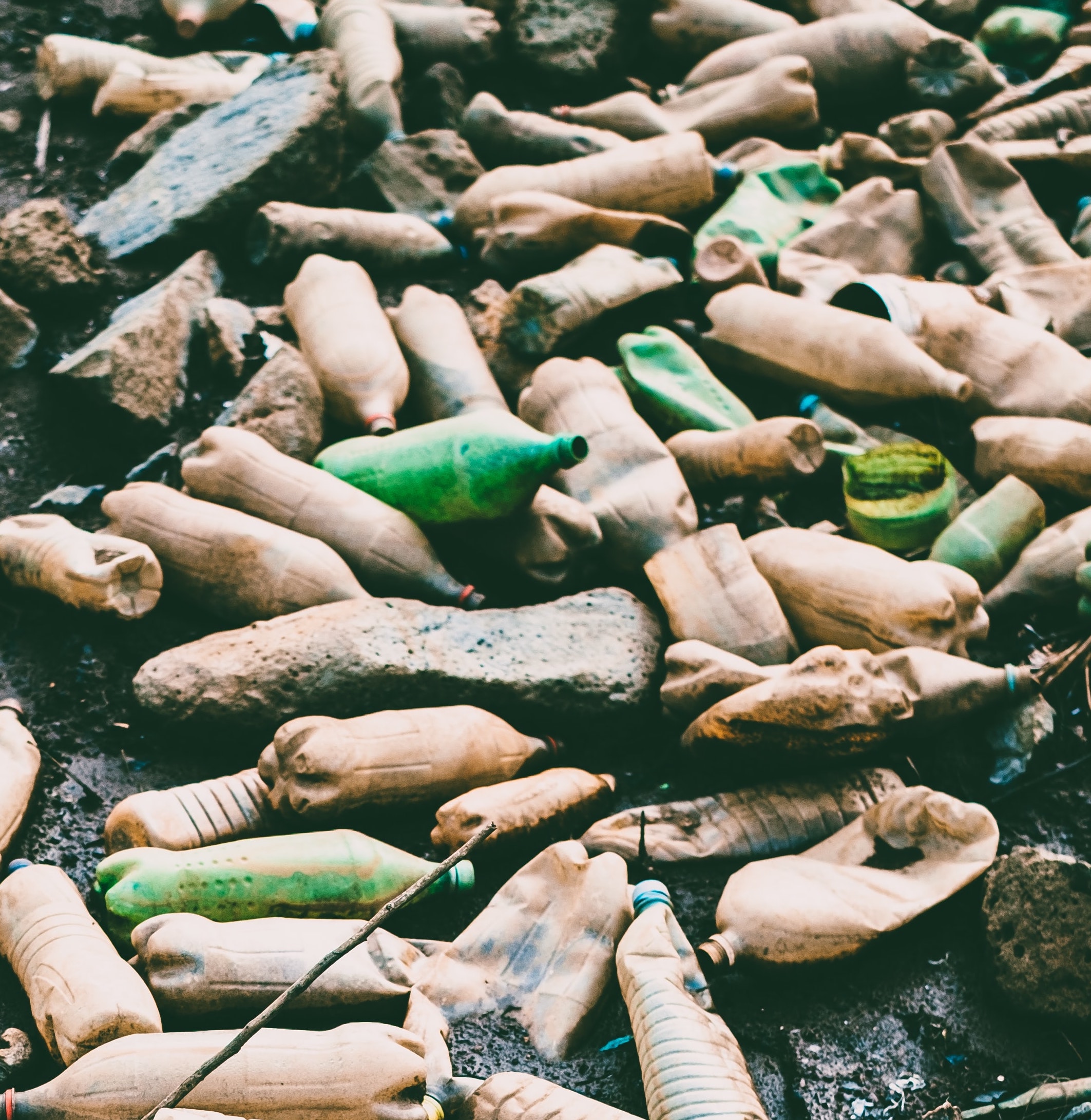
The Environment
Plastic is made from fossil fuels and takes hundreds of years to break down as it sits in landfills, ecosystems, and oceans. By replacing single-use plastic water bottles with reusable water bottles, you are lowering your carbon footprint and reducing environmental impacts from the whole lifecycle of a single-use water bottle (Source: Kor Water).

Your Money
Filling your reusable water bottle up on campus is free! You will only need to invest in one reusable bottle (or use one you already have) and you save the money otherwise spent purchasing plastic water bottles (Source: WaterBottle.IO).
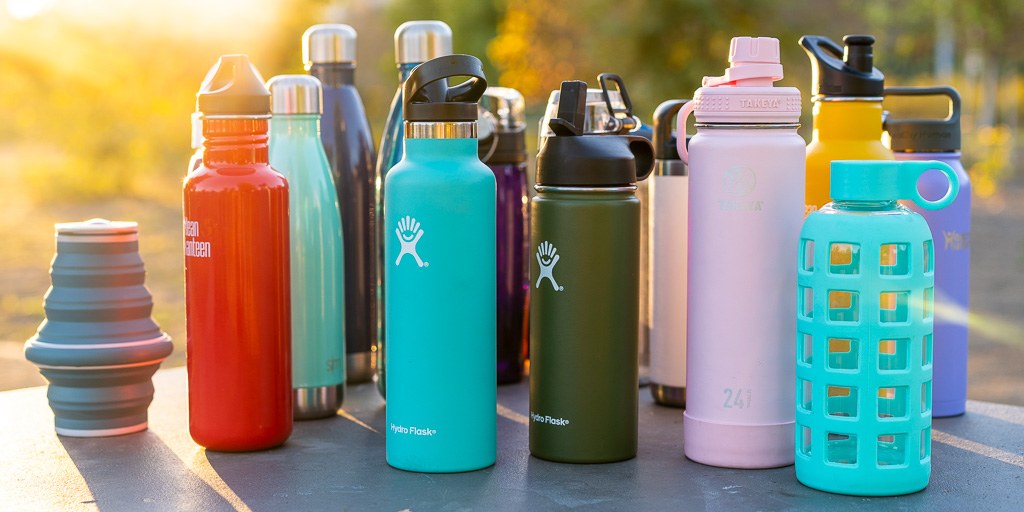
Your Health
Proper hydration is important to keep your body healthy. Most reusable bottles are larger than the standard single-use plastic bottles. By keeping a reusable bottle with you, you have the convenience and volume to drink more water in a day (Source: WaterZen).
Learn About the Impact
The Story of Bottled Water tells the story of manufactured demand—how you get Americans to buy more than half a billion bottles of water every week when it already flows from the tap. This short film explores the bottled water industry’s attacks on tap water and its use of environmental-themed advertising to cover up the mountains of plastic waste it produces.
Water Refill Points
Working Group
The Bring Your Own Bottle Working Group aims to improve the environment and health of our McMaster community through promotion of and providing access to water bottle filling stations throughout campus. The Working Group is made up of staff, students, and faculty members from across campus who aim to make campus drinking water the beverage of choice.
The Working Group reports jointly to the McMaster Okanagan Committee with support from the McMaster Sustainability Advisory Committee. If you have any questions, please send us an email at okanagan@mcmaster.ca.
Bring Your Own Bottle Working Group
Lynn Armstrong
Administrator, McMaster Okanagan Office of Health & Well-being

Lynn Armstrong
Administrator, McMaster Okanagan Office of Health & Well-being
Megan Bieksa
Manager of Communications, Facility Services

Megan Bieksa
Manager of Communications, Facility Services
Adrianna Diab
Student Researcher, Integrated Science Program

Adrianna Diab
Student Researcher, Integrated Science Program
Shelir Ebrahimi
Assistant Professor, Experiential Learning Office, Department of Chemical Engineering

Shelir Ebrahimi
Assistant Professor, Experiential Learning Office, Department of Chemical Engineering
John Hemmer
Acting Director, Maintenance Services, Facility Services

John Hemmer
Acting Director, Maintenance Services, Facility Services
Monica Palkowski
Living Learning Coordinator, Housing and Conference Services

Monica Palkowski
Living Learning Coordinator, Housing and Conference Services
Chris Roberts
Director, Hospitality Services

Chris Roberts
Director, Hospitality Services
Payton Truyens
Student Representative, McMaster Centre for Climate Change Student Chapter

Payton Truyens
Student Representative, McMaster Centre for Climate Change Student Chapter
Kate Whalen
Associate Director, Academic Sustainability Programs Office

Kate Whalen
Associate Director, Academic Sustainability Programs Office
Lynn Armstrong
Administrator, McMaster Okanagan Office of Health & Well-being
Lynn Armstrong
Administrator, McMaster Okanagan Office of Health & Well-being
Megan Bieksa
Manager of Communications, Facility Services
Megan Bieksa
Manager of Communications, Facility Services
Adrianna Diab
Student Researcher, Integrated Science Program
Adrianna Diab
Student Researcher, Integrated Science Program
Shelir Ebrahimi
Assistant Professor, Experiential Learning Office, Department of Chemical Engineering
Shelir Ebrahimi
Assistant Professor, Experiential Learning Office, Department of Chemical Engineering
John Hemmer
Acting Director, Maintenance Services, Facility Services
John Hemmer
Acting Director, Maintenance Services, Facility Services
Monica Palkowski
Living Learning Coordinator, Housing and Conference Services
Monica Palkowski
Living Learning Coordinator, Housing and Conference Services
Chris Roberts
Director, Hospitality Services
Chris Roberts
Director, Hospitality Services
Payton Truyens
Student Representative, McMaster Centre for Climate Change Student Chapter
Payton Truyens
Student Representative, McMaster Centre for Climate Change Student Chapter
Kate Whalen
Associate Director, Academic Sustainability Programs Office
Kate Whalen
Associate Director, Academic Sustainability Programs Office
Bring Your Own Bottle Advisors
Leah Allan
Lab Safety Specialist, Human Resources Services

Leah Allan
Lab Safety Specialist, Human Resources Services
Alicia Westfall
Health and Safety Specialist, Human Resources Services

Alicia Westfall
Health and Safety Specialist, Human Resources Services
Leah Allan
Lab Safety Specialist, Human Resources Services
Leah Allan
Lab Safety Specialist, Human Resources Services
Alicia Westfall
Health and Safety Specialist, Human Resources Services
Alicia Westfall
Health and Safety Specialist, Human Resources Services
Journey and Collaborators
The success of the Bring Your Own Bottle Working Group and the broader initiative would not have been possible without the valuable contributions of many individuals, groups, and departments across campus.
The BYOB Story
Starting in 2009, McMaster’s Facility Services retrofitted one fountain in every academic and administrative building on campus. The retrofits are accompanied by an educational campaign and signage, courtesy of Media Production Services, promoting the use of refillable water bottles.
In 2010, Facility Services retrofitted another 13 fountains, and the MSU designated itself a Plastic-Bottle-Free Zone. In 2011, fountains were updated with a new fountain model that included a filter system, and the MSU expanded their work by approving a Plastic-Bottle-Free Policy and creating an online Plastic-Bottle-Free Pledge.
McMaster’s Facility Services continued to invest in filtered water refill stations, reaching a total of more than 200 stations, which were installed in academic and administrative buildings across campus.
In recent years, the issue of plastic bottles surfaced from faculty, staff, and students, inspiring an investigation into the situation at McMaster. The resurgence of this issue may have been initiated by the several post-secondary institutions that banned the sale of bottled water. Lay literature presents opinions both for and against such a ban, with opponents citing consequences including reduction in consumer choice, economic impacts, and greater consumption of sugar beverages that are also sold in plastic (Source: The Harvard Crimson). The academic literature on outcomes of such bans is limited, and the findings are inconclusive with one study demonstrating that a ban in isolation resulted in an increase in plastic waste and consumption of sugar beverages.
In addition to fountain retrofits still taking place on campus, several initiatives are underway. A summary of recent initiatives follows:
SUSTAIN 2SS3 – Leadership in Sustainability, Summer 2020
With support from their Project Champions from Hospitality Services, students conducted secondary research about the outcomes of bottle bans. Despite being ‘pro-ban’ when they started, students reported the environmental and health risks of banning bottles without additional research and a strategy in place.
SUSTAIN 3S03 – Implementing Sustainable Change, Fall 2021
With support from their Project Champions from Hospitality Services and Housing and Conference Services, students conducted both a quantitative and textual analysis of data captured as part of the 2019 Rez-Wide Survey. Findings show that, of the 800+ respondents, 80% purchase bottled water and 60% keep cases of water in their residence room. Findings from the textual analysis suggest that respondents propose greater access, filtered water, and strategies by the university, such as a ban.
Note that most residence buildings did not have refill stations at this time of the survey, but filtered water spouts have since been installed.
SUSTAIN 4S06 – Leadership in Sustainability, Fall 2021 – Winter 2022
With support from their Community Project Champions from Hospitality Services and Residence Life, students interviewed current, sustainability-minded residence students about their perceptions of water bottle refilling and reuse. Following qualitative thematic analysis, findings suggest that ‘accessibility’ related to proximity across campus and the high costs of bottled water were the two largest drivers to water bottle refilling and reuse. Additionally, participants preferred high-quality and filtered water sources.
While SUSTAIN 3S03 and SUSTAIN 4S06 students were conducting their research on student perceptions of water bottle refilling and reuse, Integrated Sciences student, Adrianna Diab, focused her ISCI Independent Project on the promotion of water bottle refilling and reuse to McMaster residence students. With support from her project champions from the Academic Sustainability Programs Office and McMaster Okanagan Office of Health & Well-being, Adrianna brought together a group of diverse stakeholders to develop a communications campaign.
In January of 2022, the McMaster Okanagan Office of Health & Well-being endorsed the Bring Your Own Bottle Working Group and their mission to promote water bottle refilling and reuse while decreasing reliance on single use plastics. The group’s goals and actions focused on:
- Creation of an interactive map of water fountains across campus.
- Development of webpage with the map, FAQ, project updates, and opportunities for experiential learning.
- Installation of signage at water refill stations on campus and in residence.
- Communication to incoming residence students.
With endorsement from their sponsors and champions from McMaster’s senior leadership, the group was successful in securing two grants that enabled Adrianna to continue her work as a part-time student project coordinator over the Summer of 2022.
Between the fall of 2021 and the end of summer 2022, the Working Group successfully accomplished all their objectives.
The group is looking forward to supporting several upcoming student experiential learning projects, which will focus on data collection and analysis as well as residence student engagement.
- Alicia Westfall*, Health & Safety Specialist, Human Resources Services and Leah Allan*, Lab Safety Specialist, Human Resources Services led coordination of water quality testing in all campus buildings and developed robust Health & Safety processes for annual water testing and filter replacement. While standards existed for water testing and filter replacement existed before, Alicia and Leah implemented an approved process that establishes McMaster as a leader in quality assurance.
- Chris Roberts*, Director, Hospitality Services, served on the Working Group since inception, and has supported student experiential learning for several years, including providing access to water bottle sales data for analysis and tracking.
- Craig MacDonald*, Director of Maintenance Services, Facility Services, and John Hemmer, Acting Director, Maintenance Services, Facility Services; led the strategy, funding, and installation of more than 200 refill stations across campus and their associated promotional signage. Craig served on the Working Group since inception, and John joined the Working Group as Acting Director of Maintenance Services. Both were leaders on this initiative since the initial filters were installed in 2009.
- Facility Services and Housing & Conferences Services who undertook installation of new refill stations and newly-designed signage.
- Kate Whalen*, Associate Director, Academic Sustainability Programs Office; has been involved in the initiative since 2009, served on the Working Group since inception, and supported and continues to support sustainability student experiential learning projects.
- Lynn Armstrong*, Administrator, McMaster Okanagan Office of Health & Well-being (MOOHW); has worked on a variety of health and well-being initiatives, bringing her experience to the Working Group, which she served on since inception. Lynn has provided support and guidance in the initiative finding a home with the MOOHW.
- Megan Bieksa*, Communications Manager, Facility Services; has served on the working group since inception and leads the communications strategy and materials development. Megan has written a Daily News article about the initiative to spread awareness of the newly launched campaign.
- Monica Palkowski*, Living Learning Coordinator, Housing and Conference Services; has served on the working group since inception and helps advise on communication strategy, initiative direction, and scope from the perspective of student residence.
- Payton Truyens*, Student Representative, McMaster Centre for Climate Change Student Chapter; joined the working group to provide student insight on the campaign and contribute as someone who is involved with climate work.
- Shelir Ebrahimi*, Assistant Professor, Department of Chemical Engineering; joined the working group and contributes to education opportunities of the initiative from her perspective as both an environmental engineer and as a part of the Engineering Experiential Learning office.
- McMaster Okanagan Office of Health & Well-being provided the McMaster Okanagan Special Project Funding for Adrianna to continue her leadership in a staff position.
- The ISWO Diversity Inclusion Award offered by Student Success provided additional funding for Adrianna to continue her role.
- Holly Gibson, Manager, Marketing & Communications, Housing and Conference Services, and the Residence Life communications team; have helped develop communications material and disseminate it to incoming and new residence students.
- Richard Valentine, Associate Director, and Naz Kittani, Marketing Coordinator, from McMaster’s Marketing Department in collaboration with Simon Oakley, Creative Development Manager, Media Production Services, kindly contributed the design and production of the campaign logo and all branded promotional material.
- Dozens of students who provided feedback on the initiative name, logo, and communication strategy.
- Susan Tighe, Provost and Vice-President (Academic); Saher Fazilat, Vice-President (Operations and Finance); Paul O’Byrne, Dean and Vice-President, Faculty of Health Sciences; Debbie Martin, Assistant Vice-President/Chief Facilitites Officer, Facility Services; Deidre Henne, Assistant Vice-President (Administration) & CFO; Wanda McKenna, Assistant Vice-President & Chief Human Resources Officer; Kevin Beatty, Director and Conference Services. These individuals acted as sponsors and champions to help guide and endorse the Working Groups’ efforts and actions.
*Working Group Members
Frequently Asked Questions
Expandable List
For all general inquires, please send us an email at okanagan@mcmaster.ca
A yellow or red light at a refill station indicates that the water filter should be changed. If you notice a red or yellow light, please contact clerks@mcmaster.ca and include the location of the refill station.
There are currently over 200 refill stations across campus buildings with more stations being added each year.
Need to find a refill station? Check out our interactive map!
![]() Look for the Bring Your Own Bottle Logo at the Elkay refill stations and sinks with gooseneck spouts.
Look for the Bring Your Own Bottle Logo at the Elkay refill stations and sinks with gooseneck spouts.
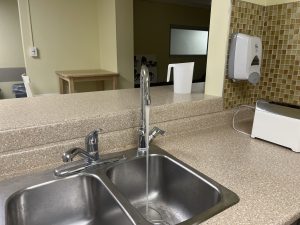
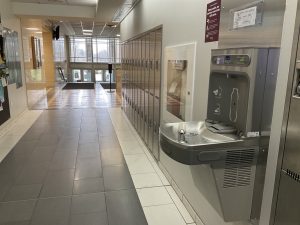
There are two places for water to be tested. The first place is before it gets to campus and the second place is at the water refill station.
- City of Hamilton water is frequently tested and consistently meets all Ontario Drinking Water Standards.
- McMaster tests water samples from refilling locations in all campus buildings each summer to ensure they meet Ontario Drinking Water Standards for lead. See Standard operating procedures for collection of water samples here and filter replacement schedule here. Look for the ‘Bring Your Own Bottle’ logo for easy identification.
- McMaster uses Elkay water refill stations in academic and administrative buildings. Refill station filters are replaced when the unit displays a red signal, which is after 3,000 refills.
- McMaster also uses Elkay filters in under-counter kitchen units designated with a ‘Bring Your Own Bottle’ sign, and these filters are changed annually each summer.
- Learn more about the type of Elkay filter used at McMaster.
Research about student perceptions of water bottle reuse and refilling at McMaster suggests that students are more likely to refill if they have convenient access to filtered water.
The Campus Store has a selection of McMaster bottles so that you can show your school pride and help the planet at the same time! Check out the current selection.
Single-use plastics are goods that are made primarily from fossil fuel-based chemicals (petrochemicals) and are meant to be disposed of right after use — often, in mere minutes. Single-use plastics are most commonly used for packaging and service ware, such as bottles, wrappers, straws, and bags (Source: NRDC.org).

